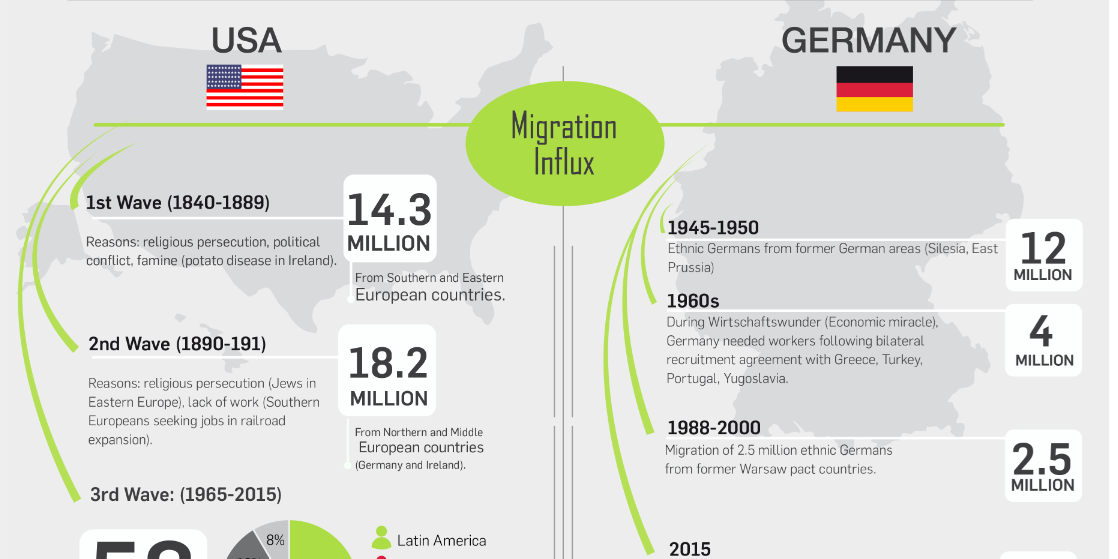
Back in Germany with 1 Million Refugees
Washington is far away if you want to follow Germany’s refugee crisis. The topic has been dominating the German media for months. But only in October, when the gymnasium in our old street was transformed into a reception center, it became concrete.
For the first time in three years, I spent Christmas in Germany. No doubt. The Christmas market, a mulled wine, the Bild newspaper, a thorough visit to the drug store: I was back home. But how did my German home look like with one million refugees?
How does Germany’s refugee crisis affect the image of my city?
Friends had reported that refugees were accommodated in the outskirts of the city. You would barely see them. I perceived it differently.
Suddenly I heard people speak Arabic on the street. Yes, I can recognize the Arabic language. Thanks to several years of Arabic language school, I can also tell the difference between Arabic and Turkish.
Small groups of younger men walk into the city during the day. Or they sit peacefully in public spaces in the evenings, have a chat. So, yes. The image of the city has changed a little.
Do refugee children go to school?
Theoretically, yes. Practically, it depends on whether the children are registered yet. As soon as a refugee crosses the German border, he is brought to a reception center somewhere in Germany. This can be close-by, but also far away. The authorities cannot keep up with the registrations. Thus, it can take weeks until the children are allowed to go to school.
An expert committee on behalf of the Bosch Foundation has estimated that approximately 155,000 school-age children have fled to Germany. That makes 1.4% more school-age children.
Do refugees receive cash benefits?
As soon as a refugee is registered as an asylum seeker, he is entitled to cash benefits. In the reception centers refugees receive accommodation, clothing and catering. Furthermore, they are entitled to an allowance. For an adult it is approximately 145 EUR per month. Those who want to know more can read about it in this Wikipedia article.
Are asylum seekers allowed to work in Germany?
In the first three months after their registration they are not allowed to work. Then they may pursue work, however, there are many restrictions. First they need a work permit, which they only receive once they have found a job. Then the authorities check whether there is no German or EU-applicant suitable for the job.
Only when their asylum request has been recognized do refugees receive an unrestricted work permit. They can also be self-employed then.
Independently of this, language skills and qualifications of course also play a large role in the application process.
How educated are the refugees?
A look into Google will not help here. The information comes from different sources, cannot be compared with one another and contradict each other. HR Info, the information broadcaster from Hessen recently reported that approximately 1/3 of checked refugees were qualified enough in order to work here as long as they had sufficient German skills. A further third would have to be trained professionally before meeting German requirements.
How are the Germans reacting?
In October 2015, the “Initiative Markt- und Sozialforschung” (Initiative for Market and Social Research) published a study on the attitude of Germans toward asylum and refugee politics:
– 2/3 of Germans saw their country as a country of immigrants. The statement, however, fluctuated depending on the regions. In the East nearly half rejected the statement.
– More than 4/5 wanted to bring border control back
– 90 percent of those questioned said that the number of accepted refugees in Germany should be limited
– and 72% demanded a complete halt to influx of refugees
New study from the Evangelical Church in Germany (EKD)
The EKD published the results of a study on the reception of refugees to Germany on 22.12.2015:
The study was conducted before the assaults in Cologne. Today the graphics would probably look different.
And what do Germans say outside of the studies?
During the holidays I met many friends. I also had several appointments. I discussed Germany’s refugee crisis with all of them. They all agreed: in Wiesbaden or Eltville you barely see them. I also noticed that nobody said a negative word. However, I am certainly only representative of my rather multicultural, liberal circle.
Lengthier talks definitely painted a somewhat more differentiated picture. The amount of 1 million people makes up almost 1% of the German population. In the suburbs of Wiesbaden the citizens defended themselves heavily. “They are welcome to come, but not to us please.” A large gymnasium in Wiesbaden, directly in the city, is supposed to take in 1,000 refugees soon. Then the refugees will no longer live on the edge of the city, basically invisible, but in the middle of everyday life.
Many of my contacts spoke about integration, which, however, should come from both sides.
My gynecologist reported about an expecting father from Syria who took off all Christian crosses in the delivery room.
My hair dresser told me that her husband, a policeman, regularly has to engage with brawls in reception centers.
Yes, I have heard or seen many things during these days.
Is integration working?
Like many other Germans I ask myself whether integration is going to work out. My French roots know that it did not work in France. Frustrated young people have lost all hope and are an easy target for radical Islamists. That should not happen to Germany under any circumstances.
Angela Merkel has been selected as Time Magazine’s person of the year. The article describes how the German chancellor, as an extraordinary politician, values facts as the base for decision-making. Der SPIEGEL once reported that the chancellery ordered 600 opinion surveys within four years.
It is very likely that she measures the mood in Germany very carefully and also regularly.
Foto credit by Alex_Mac







Germany literally gave me another chance in life, I can’t actually express my appreciation. I came to Germany as a Refugee before 18 months and right now I am working as a social worker with the German Red Cross to help another refugees with their integration.
Thank you so much for sharing your experience and feelings, Shady. I believe that Germany can manage the situation. Nobody talks anymore about the challenge of the reunification in the 90’s. Nobody seems to remember, or at least wants to talk about West Germans desdaining East Germans. I am far away, maybe I would feel differently if still living in Germany, but I am kind of proud of Germany, Angela Merkel and her decision to welcome refugees.
Good article!
About integration, I would like to report, that according to the press, Mrs Merkel said that 70% of the Yugoslavia refugees returned back home after the civil war ended there and that the Syrian and Iraqi would probably act likewise. Further as we accept these refugees according to a Geneva Convention, one can point out that this convention grants permanent residency and work authorization only to those persecuted for political reasons in the widest sense. Those fleeing just the war-like violence in their living area are subsidiary refugees and the convention warrants them only shelter as long as the war conditions subsist. I.e. Germany could well expel them some time after the war will finish. So the integration is a minor question. However one should sharply teach them that they have to respect our laws like everybody and which laws are different from their home countries. Even for practical reasons, to avoid them problems with the justice.
Thank you Walter.
I believe in the Yugoslavia figures, but I am not sure if they are accurate for Germany’s refugee crisis. A few days ago, I went in DC to a joined event of the Goethe Institut and Friedrich Ebert Stiftung. I was lucky to listen to the analysis of Paul Salem, Vice President for Policy and Research at the Middle East Institute. If he is right (and I have no reason to think he may not be), we can’t expect the end of the civil war very soon. So, let me point out to this:
The majority of the Syrian refugees are single young men. Why should they return back to Syria, once they have a life, a girlfriend, a wife, children, in Germany?
That is good insight I had been wondering what it was like on the ground and not just via mainstream media. (Comment via Linkedin group)
Exactly. It was a complete different feeling.
I heard this morning on the radio that Angela Merkel is still loosing popularity. According to a new poll conducted for ARD, this crisis pushes popular support to a four-year-low… http://www.theguardian.com/world/2016/feb/04/refugee-crisis-pushes-support-for-germanys-angela-merkel-to-four-year-low